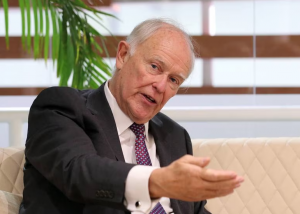Emirates to deliver ‘exceptionally good’ annual earnings, says Tim Clark
 Emirates president Tim Clark speaks to the media at the Arabian Travel Market in Dubai
Emirates president Tim Clark speaks to the media at the Arabian Travel Market in Dubai Emirates will deliver a strong set of annual financial results for its fiscal year that ended on March 31, as air travel demand, particularly in the leisure segment, records strong growth, the airline’s boss has said.
he airline is expected to release its results this month.
Emirates quickly ramped up its operations and added capacity as demand rebounded following the Covid-19 pandemic, its president Tim Clark said at the Arabian Travel Market in Dubai on Tuesday.
“We moved quickly and we moved first, and we have a set of results which are exceptionally good this year,” Mr Clark said.
Emirates, the world’s largest long-haul airline, reported a record first-half profit of Dh4 billion ($1.1billion) in the April to September period, compared with a loss of Dh5.8 billion in the same period last year.
Air travel demand will continue to be “robust” as economic recessions are temporary and leisure bookings will continue to grow, lifting up the hospitality sector, according to Mr Clark.
ADVERTISEMENT
The airline currently has 165 aircraft on order “and probably more coming” as it continues to grow its business over the coming years, he said, without elaborating.
The airline’s home base will host the biennial Dubai Airshow in November, when plane makers are likely to announce commercial jet deals.
Asked if Emirates is planning a new aircraft order, Mr Clark said: “We are always looking for orders, but I have to be quite honest. We’ve been constrained by the likes of Boeing with regard to what they’d be able to do, given the torrid time they’ve been through.
“We need to keep growing our business. We are an organic growth animal which has been successful over the years.”
Aircraft delivery delays have led Emirates to refurbish its Airbus A380s and Boeing 777s to extend the life of the aircraft.
Separately, Mr Clark told Bloomberg TV that Emirates is planning a new order in the next few months.
The airline, which currently flies 265 aircraft and has another 165 jets on order, will introduce the Airbus A350 and Boeing 777-X models to its fleet.
The 50 Airbus A350-900s will be delivered between 2024 and the “back-end of 2026, beginning of 2027”, he said.
The 300-plus seater would be well-suited to serve destinations in Africa that are too small for its 777-ER aircraft, he added.
Emirates’ 115 Boeing 777-9s and 777-8s will be handed over between 2025 and 2031, with the first delivery of the long-delayed wide-body jet expected between July and October of 2025, he said.
The flagship A380 will play a “lesser role” in the fleet from 2032.
“So as you can see, in aggregate, the fleet is growing at pace,” Mr Clark said.
Emirates is currently flying 86 of its 116 A380 superjumbos and “we need to get 20 to 30 in the air as soon as we can, but we will get there”, the airline chief said.
The carrier is facing issues returning the remaining A380s into service as they are awaiting maintenance and overhaul after they were grounded in 2020 due to the Covid-19 pandemic.
The airline is likely to recover to its pre-pandemic network in the summer of next year after returning all its A380s to the skies, Mr Clark said.
“That will attend to the holes in the network: We’re short in South America in Santiago, Australia in Adelaide, Portugal in Porto, some of the Chinese destinations aren’t there and we haven’t gone back to Edinburgh yet,” he said.
As deliveries of its A350s and 777Xs start to come in, Emirates is planning expansion in between 10 and 15 destinations in Africa, Europe, Asia and the Americas.
The airline is currently registering load factors, a measure of how well an airline fills available seats, of 80 per cent and “that is really good for May”, Mr Clark said.
The world’s biggest long-haul carrier has experienced “resilient” demand for travel, especially for services between Dubai and the UK, he added.
Emirates, which has recently signed codeshare partnerships with United Airlines and Air Canada, expects more such tie-ups to come.
Asked about the rise of new Saudi carriers and regional competitors, Mr Clark said the Dubai-based airline will not be affected.

